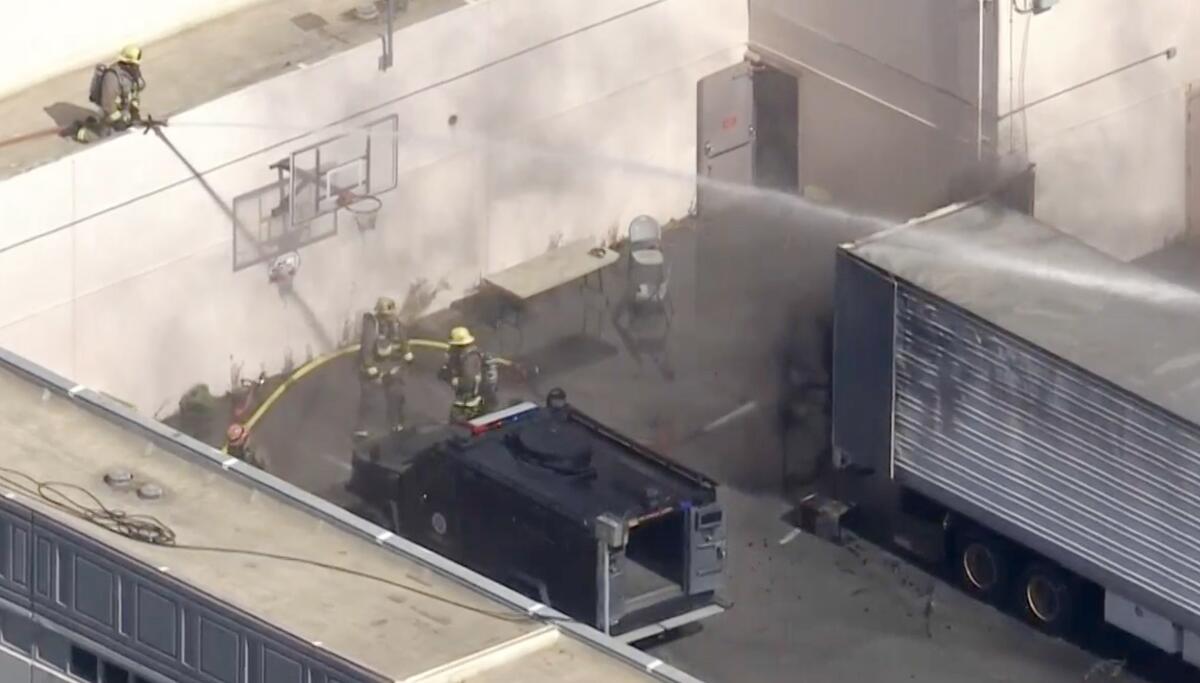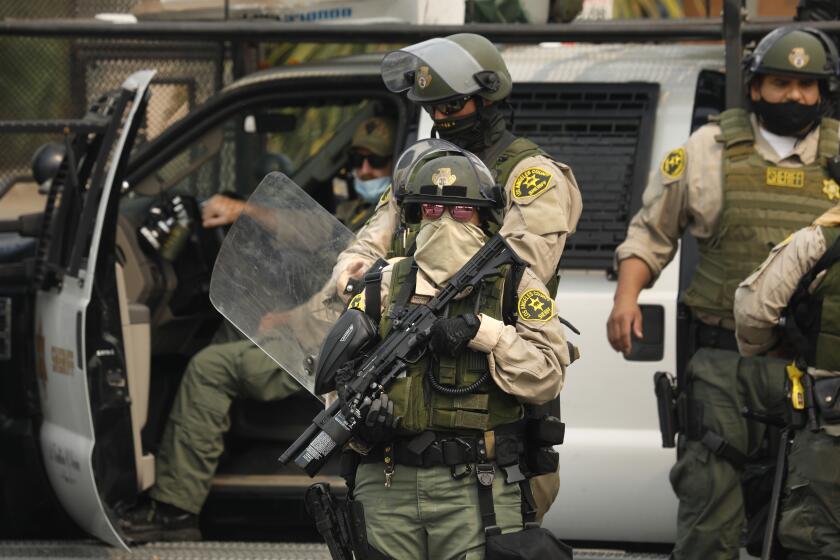‘A full-on inferno’: The history of range trailer fires at the L.A. Sheriff’s Department

- Share via
To Steven Propster, the swirling flames looked like something straight out of a Hollywood movie. They crackled and licked at his heels, and he fleetingly wondered whether he’d make it out alive.
After nearly three decades at the Los Angeles County Sheriff’s Department, Propster — then a deputy — knew this was one of his closest calls. It was the spring of 2019, and he and two co-workers had been testing a training device inside one of the department’s mobile shooting ranges when the trailer caught fire.
“It became a full-on inferno,” Propster told The Times.
Four years later, that scene seemed all too familiar, when a range trailer parked next to the county’s Castaic jail complex went up in flames and landed two deputies in the hospital with third-degree burns. It was at least the fourth time in less than a decade that a Sheriff’s Department mobile range caught fire, a frequency of blazes that several firearms experts said was surprising.
Two veteran Los Angeles County sheriff’s deputies were inside the 53-foot trailer when the fire began. It wasn’t immediately clear what caused the blaze.
“It’s curious that they’ve had this number of fires,” said Phil Ludos, a former Michigan police chief who is now vice president of a range trailer training company in Florida. “Did we not learn? If I had one fire in a mobile range, I wouldn’t have another fire.”
Typically, the Sheriff’s Department relies on range trailers so thousands of deputies can test their skills four times a year as required by department policy. After the Oct. 10 blaze, the department quickly shut down all of its mobile firing ranges, launched an internal investigation and called in the federal Bureau of Alcohol, Tobacco, Firearms and Explosives for help.
“We need to know why it happened and get to the bottom of it so we can prevent it from happening again,” Sheriff Robert Luna said afterward at a news conference.
But to some deputies and those who represent them, the latest fire seemed frustratingly preventable — especially considering how many had come before.
“It appears the Los Angeles Sheriff’s Department has been caught once again trying to ‘do more with less,’ resulting in inadequate maintenance of these range trailers and serious injuries to two of our deputies,” said Richard Pippin, president of the Assn. of Los Angeles Deputy Sheriffs. “ALADS is shocked to learn that there have been so many similar fires and there haven’t been, to our knowledge, any changes to the range trailer procedures.”
*****
The Sheriff’s Department has been using range trailers since the late 1980s. In a county the size of Los Angeles, they offered an attractive and affordable alternative to relying on more permanent firing ranges built in far-flung places. Instead of paying deputies overtime to spend a day driving to a fixed location for their required firearms testing every few months, the department could move the mobile ranges from station to station every week.
Three decades ago, officials said that, aside from convenience, in some ways mobile ranges were safer than outdoor ones. “There are no distractions,” Deputy Robert Drake told the Los Angeles Daily News in 1992. “Here, you have the target down range, and that’s it.”
At the time, the department had five trailers, though that number has since expanded to 15. The 50- to 53-foot mobile structures usually have three shooting lanes overseen by a range master. The interior walls are covered with soundproofing foam, and a thick rubber or metal plate known as a bullet trap sits behind the target.
Every few months, deputies practice in them using training rounds designed to minimize lead exposure. Like regular indoor ranges, shooting trailers require regular cleaning to prevent a dangerous buildup of lead and gunpowder.
A former range deputy with the Sheriff’s Department explained the problem in more detail.
“When you shoot a gun, there’s gunpowder and explosives inside the cartridge,” the deputy said, asking to remain anonymous due to pending litigation involving the department. “Not all of that gunpowder burns — sometimes it ends up on the floor in front of you, sometimes it ends up on your hands.”
It’s a “known problem,” he said, and can lead to blazes that get out of control.
Though mobile ranges are a common law enforcement tool, it’s not clear how often they catch fire. Multiple range experts said fires appear to be rare. The National Law Enforcement Firearms Instructors Assn. said it does not track that data, and that the risk of fires from unburned gunpowder is a possibility at any range that isn’t adequately cleaned and ventilated.
“When you tell me that there’s a fire inside a range, most often that means it either hasn’t been maintenanced properly or they’re not using the right kind of ammo,” said Ludos, vice president of Mobile Tactics, which uses range trailers to conduct firearms qualifications and training across the country. “We’ve really been active since 2015, and we have never had an incident, never had an injury with anybody on a trailer.”
The first mobile range fire Sheriff’s Department officials could find any record of was in 2016, when a contractor working on a trailer parked at the department’s Tactics and Survival Training Center started using a grinder — a type of power tool that cuts metal — inside the structure.
Sparks from the grinder started a fire, but when The Times asked for more details this month officials did not specify whether anyone was injured or how much damage the fire caused.
Three years later, in March 2019, Propster and a few deputies at the Marina del Rey station decided to set up a training scenario to prepare for the possibility of an active shooter on a boat.
Propster, who’d previously worked in SWAT, said he suggested starting off the scenario with a flashbang trainer, a nonexplosive device that resembles another common tool in the law enforcement arsenal: a flashbang, or stun grenade.
A traditional flashbang is a type of explosive that’s typically not lethal and is used to disorient suspects with a bright flash and a loud bang. A flashbang trainer is a reusable version of the device that makes a loud noise but doesn’t contain any explosives.
But before setting off a loud noise in public and possibly causing panic, Propster wanted to try out the device in a more controlled setting to check how loud it really was. Since the range trailer had soundproofing, he said, he and the other deputies decided to test it out there.
The first time, Propster said, the device went off without a hitch. One of the other deputies suggested trying it a second time, without ear protection.
They heard the loud boom they expected. But then they saw a fizzle “somewhat like an old dynamite fuse,” Propster told internal affairs investigators at the time, according to a recording of the interview that he shared with The Times.
“A flame about the size of a large candle popped up,” he continued. “It was probably an inch high.”
One of the other deputies stomped out the flame with his foot, Propster told investigators. As soon as he did, two more flames popped up nearby — and he shouted for another deputy to bring a fire extinguisher.
“He doused it — but two seconds later, flames went running up the wall,” Propster told The Times. “We ran toward the door, and the flame began to swirl and burn everything and chase us out. It was like a movie.”
The three deputies in the trailer ran to the door and burst outside, narrowly escaping as the trailer went up in flames. Unspent ammunition started to pop and explode. When firefighters arrived, Propster said, they struggled to extinguish the blaze.
“It stayed hot for two days,” he said. “It reignited twice.”
Ultimately, Propster said, he and the other deputies involved were all punished with five days of unpaid leave. Department officials confirmed that employees had been disciplined in connection with the Marina del Rey incident but did not offer specifics.
Even though Propster knew he’d started the fire — albeit accidentally — he came away from the incident worried about the department’s continued use of range trailers.
“If you have one fire, it’s a one-off,” he said. “Two, OK, what’s causing this?”
That same year, a trailer parked near the Castaic jail complex caught fire. As with the 2016 blaze, officials said the cause was a contractor with a power tool. Again, the department said the incident was investigated but did not offer additional details.
This year’s fire also started in a trailer near the Castaic complex. Officials said the range trailer — originally purchased in 1992, making it one of the department’s oldest — had been serviced and cleaned by an outside contractor in July. The department’s Facilities Services Bureau did its normal trailer maintenance there in September.
When the blaze began earlier this month, there were two deputies inside: a 17-year veteran assigned to North County Correctional Facility and a 20-year veteran assigned to Sylmar Court. One was taking a department-mandated recertification test, and the other — the range master — was supervising.
Thousands of Los Angeles County sheriff’s deputies, their supervisors and others did not complete training courses required by the state.
Though both deputies were severely burned, they are recovering and expected to survive. Representatives for InVeris Training Solutions, the company officials said built the trailer, did not respond to a request for comment.
The Sheriff’s Department has not yet said how the fire started, but department spokeswoman Nicole Nishida said investigators have preliminarily determined it was accidental.
“All the prior fires were determined to be caused by peripheral circumstances and not due to the operational functionality of the mobile ranges,” Nishida added. “The Marina del Rey incident was due to inappropriate use of the mobile range and the other two fires were caused by contractors doing maintenance to the interior.”
Several nearby sheriff’s departments — including those in Ventura, Riverside and San Bernardino counties — told The Times they do not use range trailers. But for those that do, the recent fire has been a cause for concern.
The San Diego County Sheriff’s Department said it has one range trailer but isn’t currently using it because there are no firearms qualifications underway at the moment. The department hasn’t had any problems with the trailer in the past, according to Lt. David LaDieu. But officials are “aware of the situation in Los Angeles and will monitor” it, he said.
Since the incident in Castaic, the Orange County Sheriff’s Department has stopped using its two mobile pistol ranges, even though officials there also said they hadn’t seen any signs of a problem.
“We felt it was imperative to take every precaution by shutting both down and ensuring they are inspected for any potential hazards,” Sgt. Mike Woodroof told The Times in an email. “We currently do not have a date when we expect our MPR’s [Mobile Pistol Ranges] to be operational again, but we will not rush as the safety of all that utilize them are our top priority.”
But taking the mobile ranges offline could create another problem for departments — especially those in large counties — when it comes to ensuring deputies complete their firearms qualifications. In Los Angeles, those qualifications typically take place four times a year, and it’s not yet clear how that will work for now, or whether the department will ultimately resume its use of the mobile trailers.
“In the meantime,” Nishida said, “we are looking into alternative options for firearm qualifications for personnel throughout the county.“
More to Read
Sign up for Essential California
The most important California stories and recommendations in your inbox every morning.
You may occasionally receive promotional content from the Los Angeles Times.















